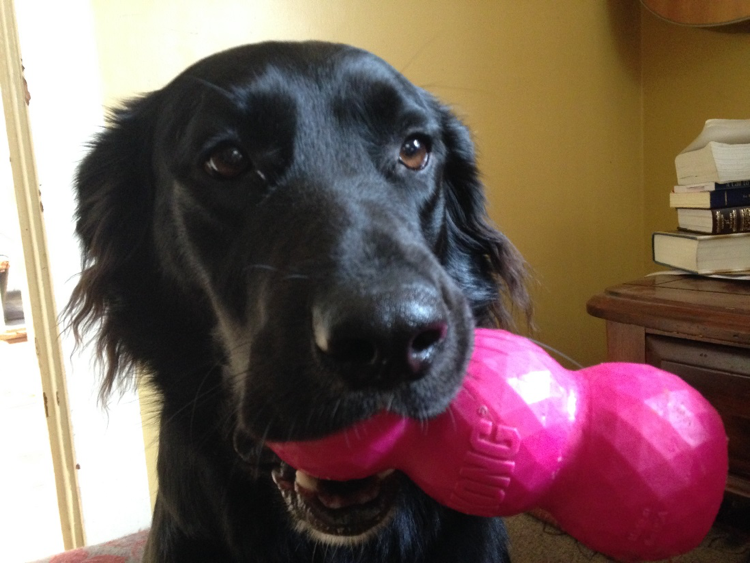Dogs explore the world with their mouth. They love to sniff things and go where their nose takes them. More often than not, their nose takes them to something they can chew on. It is important to provide safe toys that will allow them to burn off energy, provide mental stimulation and give them something safe to chew on so they don’t select your favourite new shoes!
So what is considered a safe toy?
First, let’s talk about what can happen with unsafe chew toys. Dogs can do a lot of damage to toys. Some enjoy gentle chewing and tossing a toy about and then pouncing on it. Other dogs chew with a determination to destroy the toy. This can become quite costly replacing toys and can be worse if they ingest parts of the toy. Toys are not meant to be eaten. As dogs break off pieces or pull out stuffing, they may swallow them. Then it is a dice roll on whether that material comes back up in vomit, makes the full journey to pass in the stool or gets stuck somewhere along the way and requires surgery to get it out. Jagged items like bones can not only obstruct but can also do damage as the gastrointestinal tract tries to digest the item.
Another concern about unsafe chew toys is damage to the teeth. Dog teeth are not meant to come out. If you look at x-rays of a dog tooth you will see their roots are very deep. Dogs can be very determined chewers and quite often it becomes a battle of the toy versus the tooth. When the toy is too hard or the angle of the bite against the toy is just right (or wrong), the tooth loses out and a fracture occurs. Broken teeth can be quite painful. When a tooth breaks off, even just a part of the tooth, the inner pulp is suddenly exposed which can be quite painful. Dogs will avoid chewing on that side of their mouth and may shy away from having their face touched or stop playing with their toys. Many dogs suffer in silence. There will be a sensitivity to hot and cold as well. Left untreated, bacteria gets into the pulp and makes it way down the tooth leading to infection and a tooth root abscess. Ouch.
What to look for in a safe toy then? Know your dog and their preferences. Supervise with any new toys to ensure they are playing safely. Is the toy as hard as or harder than the teeth? That is asking for a tooth fracture. Ensure toys have a bit of give to them. If your dog is an aggressive chewer, they need to have something without pieces they can chew off. If you give toys like that, be around when they have them and remove them once they get to the point of possibly getting parts off.
I have three large breed dogs. Two of my dogs cannot have any stuffed toys. They don’t eat the stuffing but the toy will be ripped apart within 2 minutes. That is not an economical purchase. Two of my dogs (one of my current dogs and another dog that has since passed away) broke premolar teeth on a digestible treat that is very popular. Dental surgery was needed for both dogs. The line of toys that works best for my dog family now is the Kong Extreme line. Fingers crossed, they haven’t been able to destroy those yet. I have tried other toys in the Kong line and some of the other toys they carry (regular Kong or Kong genius) have not been tough enough for my dogs. They may work for yours. They also have a line of toys for puppies that are softer. Puppy teeth are not as hard as adult teeth so a softer toy makes sense for these critters.
Remember, all dogs are different but most dogs love to chew. Until you know what toys work for your canine companion, supervise for safety and once you find what works, buy a few of them in a variety of shapes and sizes to keep their interest. Rotate through your toys to keep their interest. Stuff toys with their favourite treats. The beehive shaped Kong can be stuffed with their favourite canned food and then frozen to make an hour of fun! See how fast your dog licks it clean!
Have fun and enjoy watching your dog chew on their favourite toy – and not your favourite new shoes!
Written by Jen Kendrick, Site Coordinator




